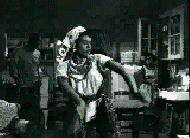|
Lorraine Hansberry's A Raisin in the Sun |
|
|
TABLE OF CONTENTS |
Character analysis: Beneatha Younger - "Bennie" "Or fester like a sore - / and then run?"
Unfortunately, no matter how true the foundation of this dream may be, Bennie is unrealistic about the obstacles that threaten her dream; namely, her social status, race, and gender. She refuses to acknowledge the reality that many people share Walter's opinion that she should either get married or be a nurse like other women. Bennie's downfall is her attraction to the unconventional. It causes her frustration and forces her dreams to "fester like a sore" on the shelf of improbability. The major reason her dream can be halted is the gap between how she sees herself and how the world sees her. She is constantly seeking ways to express herself because she is under the false impression that she can access all the world has to offer. The culture of the time wants to force her into stereotypes that fall short of her visions. Bennie suffers from an arrogance and an ignorance about
her dreams. She has confidence that her dream will be cared for (i.e.
she expects Mama to put some of the insurance money toward her education).
Although she defends herself by claiming she never asks for anything,
the perpetuation of multiple and complex dreams demonstrates The loss of her medical school funding as a result of Walter's faltering jolts her into looking at the harsh cruelties of reality. In a conversation with Asagai, she says that there is not any real progress. Instead, Bennie thinks that life is a circle in which people fool themselves with a mirage of false hopes [27]. Asagai, as the voice of reason and insight from outside the four walls of the Younger apartment, says that life is an eternal line where you cannot see the beginning, the end, or the changes in between. Perception of this fact is skewed based upon peoples' outlook - those who dream and see the changes are idealists and those who see life as a circle of no progress are called realists [28]. Bennie is representative of what progress has created. The advancements of today are settled for instead of challenged in an effort to once again improve the world. People are quick to give up hope and turn cynical rather than dare to dream and be the innovators of a new generation. In the end, Bennie is reenergized by witnessing her brother's prideful stand, but her journey to find herself is far from over. With the possibility of marrying Asagai and moving to Africa dangling before her, Bennie has a renewed sense that opportunities are not guaranteed but determination can one day create them.
|
 The
Art of Social Criticism:
The
Art of Social Criticism:  Bennie
is an eccentric and eclectic young, African American woman. She is a
serial dreamer who takes pleasure in dabbling in endless possibilities.
Ever since she was a child, Bennie has shifted between activities ranging
from photography and play-acting to horseback riding and the guitar.
In one of the more humorous yet poignant scenes of the film, Bennie
dances around in traditional African clothing to an African tune as
a sign of yet another whimsical, all-consuming interest [
Bennie
is an eccentric and eclectic young, African American woman. She is a
serial dreamer who takes pleasure in dabbling in endless possibilities.
Ever since she was a child, Bennie has shifted between activities ranging
from photography and play-acting to horseback riding and the guitar.
In one of the more humorous yet poignant scenes of the film, Bennie
dances around in traditional African clothing to an African tune as
a sign of yet another whimsical, all-consuming interest [ her
refusal to set limits on her future. Also, as Walter points out, there
is a "line between asking and just accepting", and she is
obviously ready to take what is offered to her [
her
refusal to set limits on her future. Also, as Walter points out, there
is a "line between asking and just accepting", and she is
obviously ready to take what is offered to her [